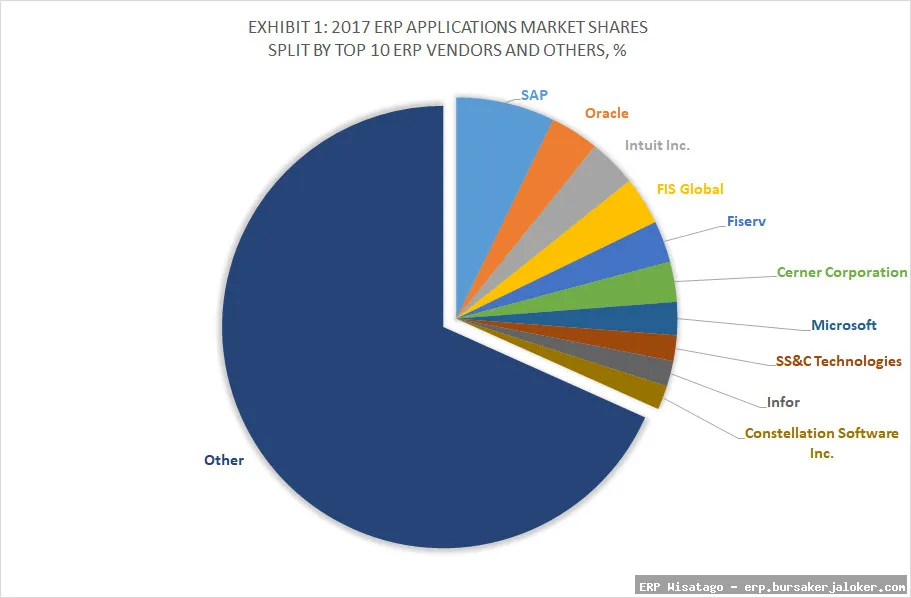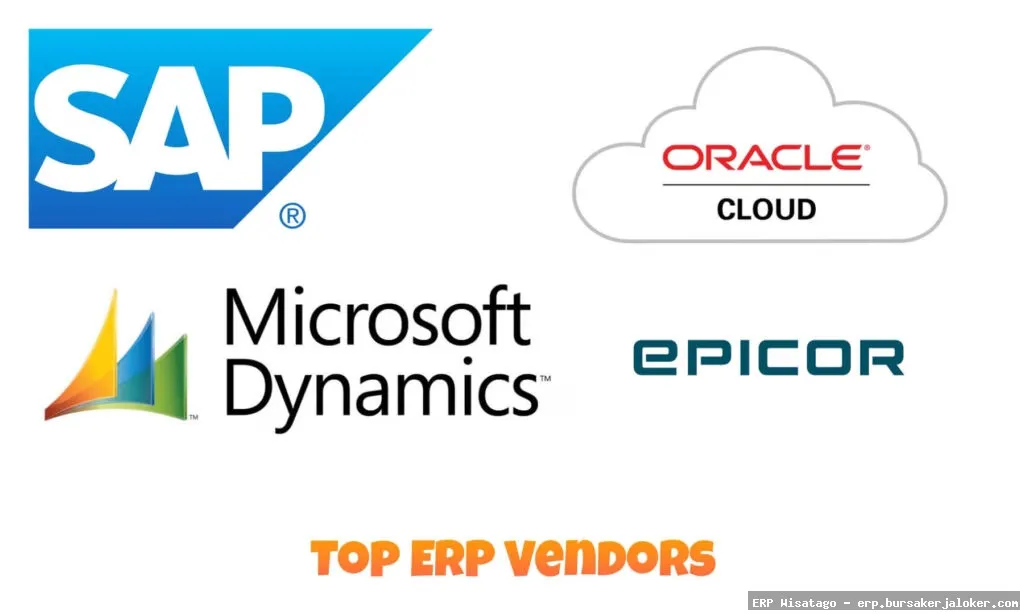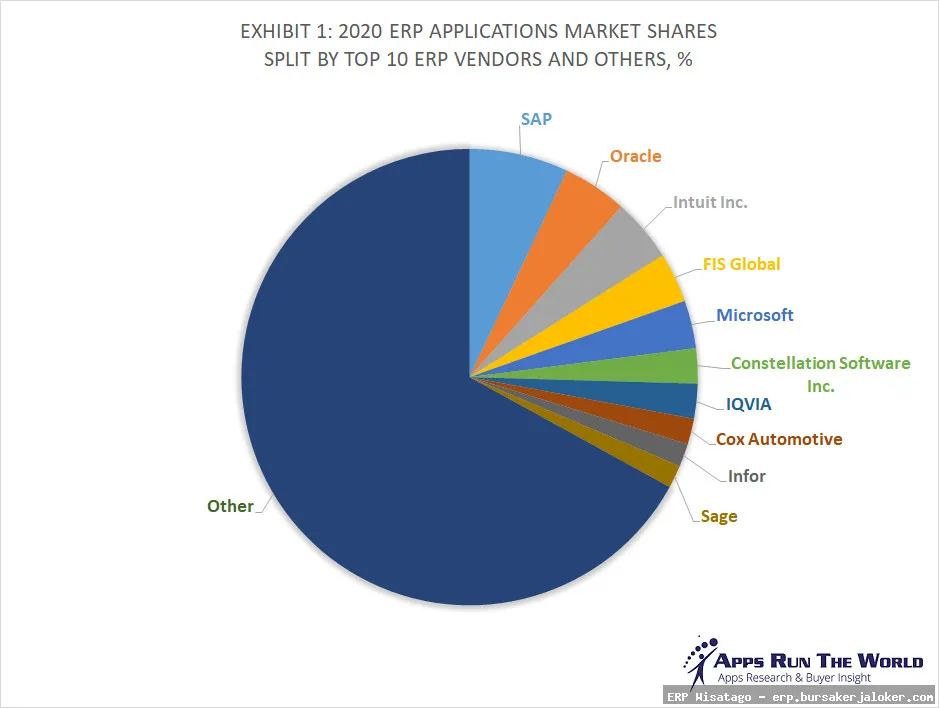Choosing the right Enterprise Resource Planning (ERP) system is a monumental decision for any business. It’s not just about implementing software; it’s about fundamentally changing how your organization operates. Having been involved in several ERP implementations, I can tell you firsthand that the process can be both transformative and, frankly, a bit daunting. The key is to understand your specific business needs, do your research, and select a vendor that aligns with your long-term goals.
The ERP market is crowded, with a plethora of vendors vying for your attention. From established giants to niche players specializing in specific industries, the options can feel overwhelming. Making the wrong choice can lead to costly delays, frustrated employees, and ultimately, a system that doesn’t deliver the promised benefits. That’s why a thorough understanding of the top ERP vendors and their offerings is crucial.

This guide aims to provide you with a comprehensive overview of the leading ERP vendors, their key features, and the factors you should consider when making your selection. We’ll delve into the strengths and weaknesses of each vendor, discuss the types of businesses they cater to, and offer practical advice based on real-world experiences. Whether you’re a small business looking to streamline your operations or a large enterprise seeking a more robust and scalable solution, this guide will help you navigate the complex world of ERP and make an informed decision.
Understanding Enterprise Resource Planning (ERP)
At its core, ERP is an integrated software system that manages and automates many of the business processes related to operations, manufacturing, finance, supply chain, human resources, and customer relationship management. Think of it as the central nervous system of your organization, connecting all the different departments and functions to a single, unified platform.
Key Benefits of Implementing an ERP System
- Improved Efficiency: Automating tasks and streamlining workflows reduces manual errors and saves time.
- Better Decision-Making: Real-time data and analytics provide insights into key performance indicators (KPIs), enabling informed decisions.
- Increased Collaboration: A centralized system fosters better communication and collaboration between departments.
- Reduced Costs: Optimizing processes and eliminating redundancies can lead to significant cost savings.
- Enhanced Customer Service: Access to accurate and up-to-date information allows for faster and more efficient customer service.
- Improved Compliance: ERP systems can help businesses comply with industry regulations and standards.
Common Challenges During ERP Implementation
While the benefits of ERP are undeniable, the implementation process can be challenging. Some common pitfalls include:
- Lack of Clear Requirements: Failing to define your specific business needs and requirements can lead to selecting the wrong system.
- Inadequate Planning: Insufficient planning can result in delays, cost overruns, and a poorly implemented system.
- Poor Data Migration: Migrating data from legacy systems to the new ERP system can be complex and time-consuming.
- Insufficient Training: Proper training is essential for users to effectively utilize the new system.
- Resistance to Change: Employees may resist adopting new processes and workflows.
Overcoming these challenges requires careful planning, effective communication, and strong leadership. It’s crucial to involve all stakeholders in the process and provide adequate training and support to ensure a smooth transition.
Top ERP Vendors: A Detailed Overview
Now, let’s delve into the specifics of some of the top ERP vendors in the market. This is not an exhaustive list, but it covers some of the most popular and widely used solutions.
SAP S/4HANA
SAP is one of the largest and most well-known ERP vendors in the world. SAP S/4HANA is their flagship ERP system, built on the in-memory platform SAP HANA. It offers a comprehensive suite of modules covering all aspects of business operations, including finance, manufacturing, supply chain, and human resources.
- Strengths: Comprehensive functionality, scalability, industry-specific solutions, strong analytics capabilities.
- Weaknesses: Can be complex and expensive to implement, requires significant IT resources, steep learning curve.
- Target Audience: Large enterprises and multinational corporations.
- Key Features: Real-time analytics, embedded AI and machine learning, intelligent automation, personalized user experience.
Practical Insight: SAP implementations often require a dedicated team of consultants and a phased approach. Start with the core modules and gradually roll out additional functionality as needed. Proper data governance is critical for success.
Oracle NetSuite
NetSuite is a cloud-based ERP system that is particularly popular among small and medium-sized businesses (SMBs). It offers a unified platform for managing financials, CRM, and e-commerce operations.
- Strengths: Cloud-based, easy to use, relatively quick to implement, integrated suite of applications.
- Weaknesses: Can be expensive for small businesses, limited customization options compared to SAP.
- Target Audience: Small and medium-sized businesses.
- Key Features: Financial management, CRM, e-commerce, supply chain management, manufacturing.
Practical Insight: NetSuite’s cloud-based nature simplifies implementation and reduces the need for on-premise IT infrastructure. However, ensure your internet connection is reliable to avoid disruptions.
Microsoft Dynamics 365
Microsoft Dynamics 365 is a suite of intelligent business applications that includes ERP and CRM modules. It offers a flexible and scalable solution that can be customized to meet the specific needs of different businesses. It integrates seamlessly with other Microsoft products, such as Office 365 and Power BI.
- Strengths: Flexible and scalable, integrates with other Microsoft products, user-friendly interface, strong CRM capabilities.
- Weaknesses: Can be complex to customize, requires technical expertise, licensing costs can be confusing.
- Target Audience: Small to medium-sized businesses, large enterprises.
- Key Features: Financial management, supply chain management, manufacturing, CRM, sales, marketing.
Practical Insight: Leverage the integration with other Microsoft products to streamline workflows and improve collaboration. Consider using Power BI for advanced reporting and analytics.
Infor ERP
Infor offers a range of ERP solutions tailored to specific industries, such as manufacturing, healthcare, and hospitality. Their solutions are designed to address the unique challenges and requirements of each industry.

- Strengths: Industry-specific solutions, cloud-based options, flexible deployment models.
- Weaknesses: Can be expensive, implementation can be complex, integration with other systems may require custom development.
- Target Audience: Mid-sized to large businesses in specific industries.
- Key Features: Industry-specific functionality, supply chain management, manufacturing, financials, asset management.
Practical Insight: If you operate in a specific industry, consider Infor’s industry-specific solutions. They often offer out-of-the-box functionality that can save time and money.
Epicor ERP
Epicor ERP is a global provider of industry-specific software designed to fit the precise needs of manufacturing, distribution, retail, and service organizations. Their focus on these key industries allows for deep specialization and targeted solutions.
- Strengths: Strong industry focus, modular design, cloud and on-premise options, user-friendly interface.
- Weaknesses: Can be less feature-rich for businesses outside their core industries, customization may require technical expertise.
- Target Audience: Mid-sized manufacturers, distributors, retailers, and service providers.
- Key Features: Manufacturing execution system (MES), supply chain management, product lifecycle management (PLM), financial management, customer relationship management (CRM).
Practical Insight: Epicor’s modular design allows businesses to implement specific functionalities as needed, making it a cost-effective option for growing companies. Take advantage of their industry-specific expertise during the implementation process.
Choosing the Right ERP Vendor: Key Considerations
Selecting the right ERP vendor is a critical decision that can have a significant impact on your business. Here are some key factors to consider:
Define Your Business Requirements
The first step is to clearly define your business requirements. What are your pain points? What processes do you need to improve? What are your long-term goals? Creating a detailed list of requirements will help you narrow down your options and select a system that meets your specific needs.
Consider Your Budget
ERP implementations can be expensive. It’s important to consider your budget and select a system that you can afford. Don’t just focus on the initial cost of the software; also factor in implementation costs, training costs, and ongoing maintenance costs.
Evaluate Scalability
Choose an ERP system that can scale with your business. As your business grows, your ERP system should be able to accommodate your increasing needs.
Assess Integration Capabilities
Make sure the ERP system can integrate with your existing systems. Seamless integration is essential for ensuring data accuracy and avoiding data silos.
Check Vendor Reputation and Support
Research the vendor’s reputation and check customer reviews. Make sure the vendor offers reliable support and training.
Consider Cloud vs. On-Premise Deployment
Decide whether you want a cloud-based or on-premise ERP system. Cloud-based systems are generally easier to implement and maintain, while on-premise systems offer more control and customization.
Get a Demo and Talk to References
Before making a decision, get a demo of the ERP system and talk to other customers who have implemented the system. This will give you a better understanding of the system’s capabilities and limitations. Effective IT management often hinges on proactive monitoring, and RMM plays a crucial role in that endeavor
.
Conclusion
Choosing the right ERP system is a complex process that requires careful planning and consideration. By understanding your business needs, researching the top ERP vendors, and evaluating the key factors discussed in this guide, you can make an informed decision and select a system that will help you streamline your operations, improve your decision-making, and achieve your business goals. Remember that successful ERP implementation is not just about the software; it’s about the people, the processes, and the commitment to change.

Don’t rush the decision. Take your time, do your research, and involve all stakeholders in the process. A well-implemented ERP system can be a game-changer for your business, but a poorly implemented system can be a costly and frustrating experience. Choose wisely, and you’ll be well on your way to reaping the many benefits of ERP.
Finally, remember that the ERP landscape is constantly evolving. New technologies and vendors are emerging all the time. Stay informed about the latest trends and developments in the industry to ensure that you’re making the best possible decision for your business.
Frequently Asked Questions (FAQ) about top ERP vendors
What is top ERP vendors?
top ERP vendors is a topic that many people search for information about. This article provides comprehensive and reliable information about top ERP vendors to help you understand it better.
Why is top ERP vendors important?
top ERP vendors has an important role because it can help you get the information you need. Understanding top ERP vendors will provide benefits and advantages for you.
How can I get more information about top ERP vendors?
For more information about top ERP vendors, you can read the complete article above or contact relevant official sources. We also recommend that you always update your information as details can change over time.
